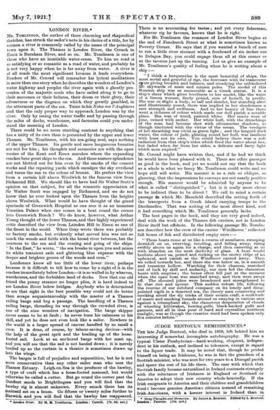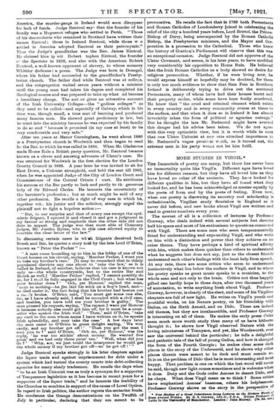JUDGE RENTOUL'S REMINISCENCES.*
Tax late Judge Rentoul, who died in 1919, left behind him an interesting if somewhat incomplete autobiography. He was a typical Ulster Presbyterian—hard-working, eloquent, indepen- dent in his outlook, and inclined to tolerance, except in regard to the liquor trade. It may be noted that, though he prided himself on being an Irishman, he was in fact the grandson of a Scottish minister, who was sent for two years to a Donegal parish and spent the rest of his life there. The ease with which that Scottish family became naturalized in Ireland contrasts strangely with the reluctance of Irishmen in England or Scotland or America to adopt their new country whole-heartedly. If the Irish emigrants to America and their children and grandchildren would become genuine American citizens instead of remaining Irish-Americans, with a keener interest in Ireland than in • Sgray Thoughts and M mintier. By James A. lentoul. Bated by L. Bentoul. London Poisons. [ 1 sa . net.)
America, the murder-gangs in Ireland would soon disappear for lack of funds. Judge Rentoul say' that the founder of his family was a Huguenot refugee who settled in Perth. " Those of his descendants who remained in Scotland have written their names Rintoul ; those in Ireland Rentoul, while those w o settled in America adopted Rantoul as their patronymic." Thus the Judge's grandfather was the Rev. James Rintoul. He claimed kins ip wit Robert tephen Rintoul, the founder
o' the Spectator in 1828, and also with the American Robert Rantoul, a well-known opponent of slavery, to whose memory
Whittier dedicate I a poem. The Judge was born in Donegal, where his father had succeeded to the grandfather's Presby- terian churoh. The father died while Rentoul was at college,
and the congregation waited seven years without a minister until the young man had taken his degree and completed his theological course and was prepared to take up what ad become
a hereditary charge. The aut. or gives an attractive account of the Irish University Colleges—the " godless colleges " as they used to be called—and especially of Galway, which in his time was, though small, a true seat of learning and produced many famous men. He showed great proficiency in law, but he went into the ministry because he was expected by his family to do so and " because it promised (in my case at least) to be very comfortable and very safe."
After ten years at Manor Cunningham, he went about 1880 to a Presbyterian church in Woolwich and then began to read
Jo! the Bar, to which he was called in 1884. When Mr. Gladstone made Home Rule a British party question, Mr. Rantoul became known as a clever and amusing advocate of Ulster's case. He was returned for Woolwich in the first election for the London County Council in 1888. A year later he was invited to sit for East Down, a Unionist stronghold, and held the seat till 1902, when he was appointed Judge of the City of London Court and Commissioner of the Central Crimin I ourt. He attributes his success at the Bar partly to luck and partly to th generous help of Sir Edward Clarke. He laments the uncertainty of the barrister's profession ; but as much might be said of any other profession. He recalls a right of way case in which he, together wit., his junior and the solicitor, strongly urged the plaintiff not to fight a hopeless action :-
" But, to our surprise and that of every one except the opti- mistic litigant, I opened it and closed it and got a judgment in my favour so strong and emphatic that the other side did not dare to appeal. The judge was that most able of Chancery judges, Mr. Justice Byrne, who in this case allowed equity to override the clear letter of the law."
In discussing certain oases in wlfeh litigants deceived both Bench and Bar, he quotes a story told by the late Lord O'Brien, known as " Peter the Packer " :-
" A man came bounding up to him in the lobby of one of the Court houses on his circuit, saying, Masther Pether, I want you to take my brother's case.' [It may be remarked that in thinly populated districts any one about to take the law,' as it is called In Ireland, of another, believes that his case is known not only to—the whole countryside, but to the entire Bar and Bench as well.] ' Masther Pether' replied, 'I cannot possibly do so, for I shall be fully engaged in the Civil Court ; but what has your brother done ? ' Och, yer Honour,' replied the man, next to nothing—he ,list laid his stick on a boy's head, and— he died ender it,' the fact being that his brother had beaten out a in... .'s brains. O'Brien said, You must get some one else, for, as I have already said, I shall be occupied with a civil case, and besides, you have told me your brother is guilty.' The man pressed his request, saying, The rayson I want yer Honour is because nobody else could get him off, for it must be a coun- sellor who spakes the Irish well.' Then,' said O'Brien, take my card to the man whose name I have written on it, he speaks Irish splendidly, and may take the case.' A few days later the man came to O'Brien in great delight saying, We won easily, and my brother got off ! " Then you got the man I sent you to ? ' said O'Brien. Och no, per Honour,' was the reply, he was too stickin' about money. He wanted five poun' and we had only three poun' ten.' Well, what did you do ? " Why, sor, we just tould the interpreter he would get the whole money if my brother got off—an he got off ! ' "
Judge Renton] speaks strongly in his later chapters against the liquor trade and against imprisonment for debt under a system which had turned the county courts into debt-collecting agencies for many shady tradesmen. He recalls the days when " to be an Irish Unionist was as truly a synonym for a supporter of Temperance legislation as it has become in recent years for a supporter of the liquor trade," and he laments the inability of
the Churches to combine in support of the cause of Local Option. In regard to Irish politics, the author regrets the sectarian feuds.
He condemns the Orange demonstrations on the Twelfth of July in partioular, declaring that they are meant to be
provocative. He recalls the fact that in 1789 both Protestants and Roman Catholics of Londonderry joined in celebrating the relief of the city a hundred years before, Lord Bristol, the Prince. Bishop of Derry, being accompanied by the Roman Catholic Bishop, the Presbyterian ministers, and the Mayor and Cor. poration in a procession to the Cathedral. Those who know the history of Grattan's Parliament will observe that this was an exceptional occasion. Judge Rentoul did not approve of the Ulster Covenant, and seems, in his later years, to have modified very considerably his opposition to Home Rule. He believed that the Irish Roman Catholics as a body showed no desire for religious persecution. Whether, if he were living now, he would express himself so hopefully may be doubted, for there is only too much evidence to show that Sinn Fein in Southern Ireland is deliberately trying to drive out the scattered Protestants, many of whom have had their houses burnt and their property stolen, while some have been foully murdered. Ho knew that " the cruel and criminal element which exists in every country and in every community comes at times to the surface, and that when it does so in Ireland it has almost invariably taken the form of political or agrarian outrage." But he thought the late Mr. Redmond might have averted this danger had his advice been taken. We do not agree with this very optimistic view, but it is worth while to note that one Ulster Unionist at any rate attached importance to Mr. Redmond's vague promh es w deh, as it turned out, the extreme men in his party would not let him fulfil.



































 Previous page
Previous page